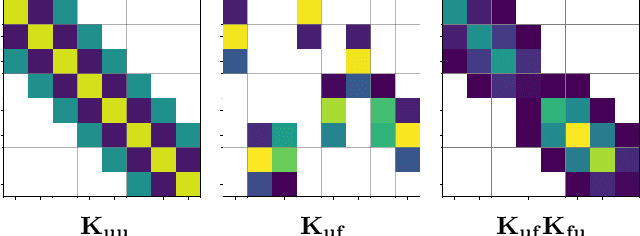Harry Jake Cunningham
Reparameterized Multi-Resolution Convolutions for Long Sequence Modelling
Aug 18, 2024Abstract:Global convolutions have shown increasing promise as powerful general-purpose sequence models. However, training long convolutions is challenging, and kernel parameterizations must be able to learn long-range dependencies without overfitting. This work introduces reparameterized multi-resolution convolutions ($\texttt{MRConv}$), a novel approach to parameterizing global convolutional kernels for long-sequence modelling. By leveraging multi-resolution convolutions, incorporating structural reparameterization and introducing learnable kernel decay, $\texttt{MRConv}$ learns expressive long-range kernels that perform well across various data modalities. Our experiments demonstrate state-of-the-art performance on the Long Range Arena, Sequential CIFAR, and Speech Commands tasks among convolution models and linear-time transformers. Moreover, we report improved performance on ImageNet classification by replacing 2D convolutions with 1D $\texttt{MRConv}$ layers.
RecMoDiffuse: Recurrent Flow Diffusion for Human Motion Generation
Jun 11, 2024



Abstract:Human motion generation has paramount importance in computer animation. It is a challenging generative temporal modelling task due to the vast possibilities of human motion, high human sensitivity to motion coherence and the difficulty of accurately generating fine-grained motions. Recently, diffusion methods have been proposed for human motion generation due to their high sample quality and expressiveness. However, generated sequences still suffer from motion incoherence, and are limited to short duration, and simpler motion and take considerable time during inference. To address these limitations, we propose \textit{RecMoDiffuse: Recurrent Flow Diffusion}, a new recurrent diffusion formulation for temporal modelling. Unlike previous work, which applies diffusion to the whole sequence without any temporal dependency, an approach that inherently makes temporal consistency hard to achieve. Our method explicitly enforces temporal constraints with the means of normalizing flow models in the diffusion process and thereby extends diffusion to the temporal dimension. We demonstrate the effectiveness of RecMoDiffuse in the temporal modelling of human motion. Our experiments show that RecMoDiffuse achieves comparable results with state-of-the-art methods while generating coherent motion sequences and reducing the computational overhead in the inference stage.
Actually Sparse Variational Gaussian Processes
Apr 11, 2023



Abstract:Gaussian processes (GPs) are typically criticised for their unfavourable scaling in both computational and memory requirements. For large datasets, sparse GPs reduce these demands by conditioning on a small set of inducing variables designed to summarise the data. In practice however, for large datasets requiring many inducing variables, such as low-lengthscale spatial data, even sparse GPs can become computationally expensive, limited by the number of inducing variables one can use. In this work, we propose a new class of inter-domain variational GP, constructed by projecting a GP onto a set of compactly supported B-spline basis functions. The key benefit of our approach is that the compact support of the B-spline basis functions admits the use of sparse linear algebra to significantly speed up matrix operations and drastically reduce the memory footprint. This allows us to very efficiently model fast-varying spatial phenomena with tens of thousands of inducing variables, where previous approaches failed.
 Add to Chrome
Add to Chrome Add to Firefox
Add to Firefox Add to Edge
Add to Edge